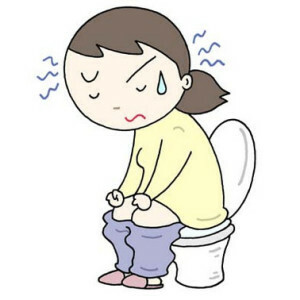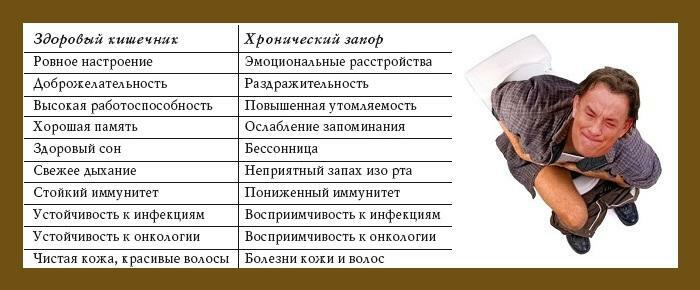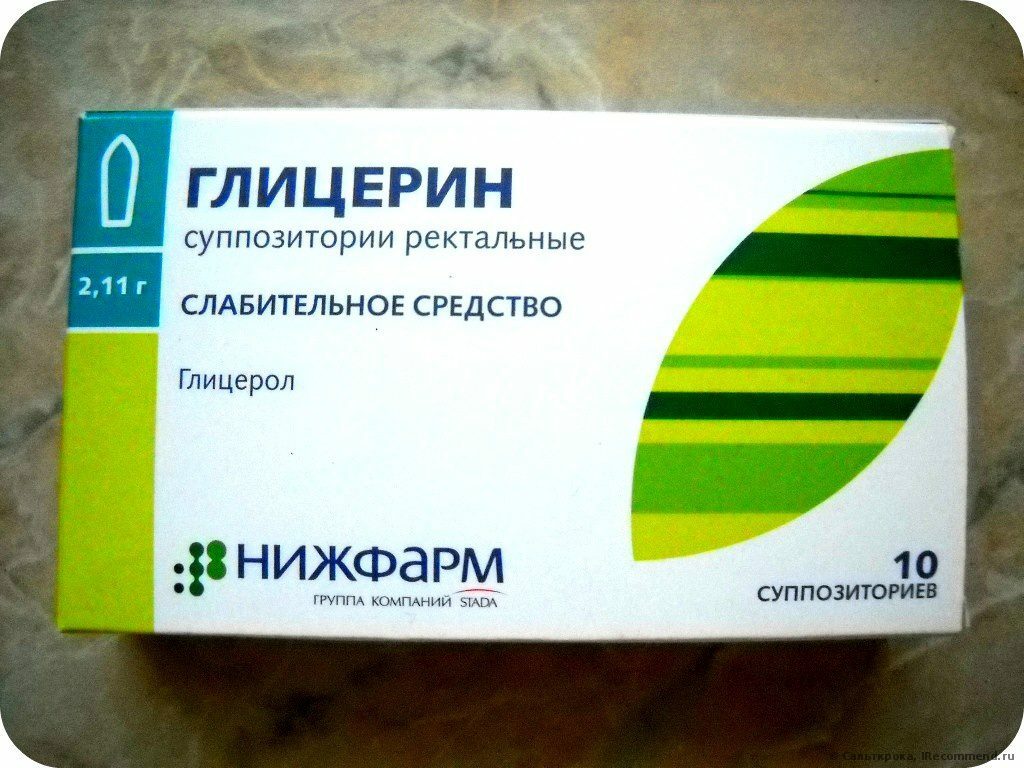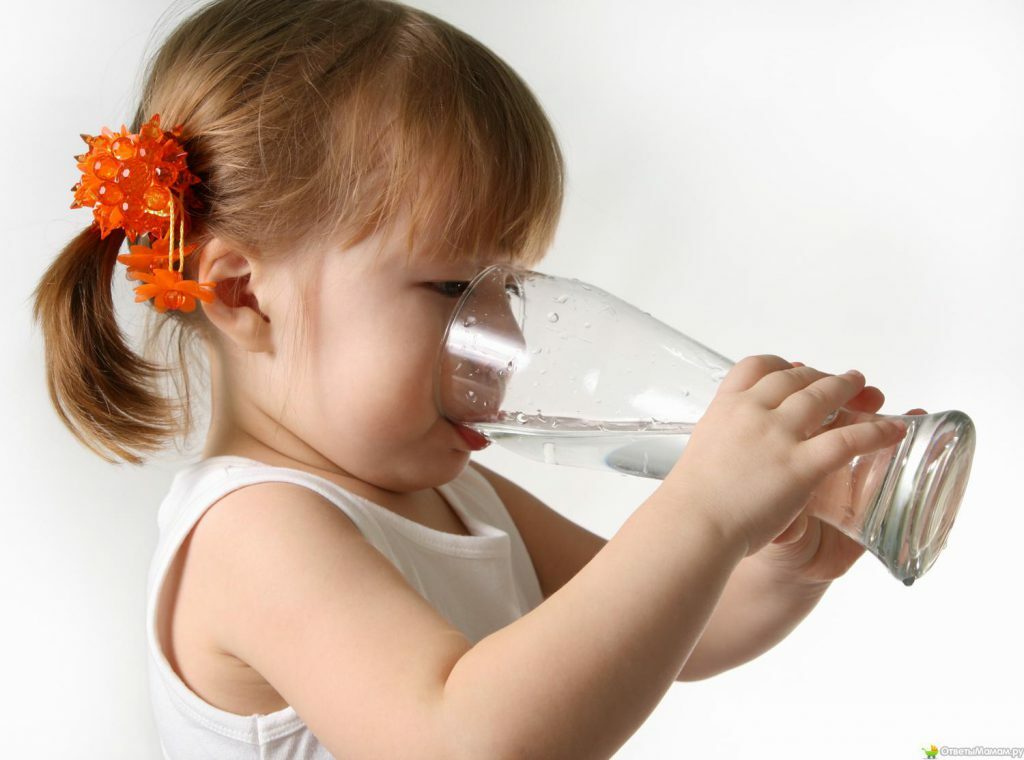What can constipation be and how to deal with them?
In modern society, defecation disorders are a common problem, in the search for a solution to which people are wondering what constipation is.
The difficulties of defecation can be caused by a lot of commonplace reasons. To cope with them and prevent the possible occurrence of constipation, you need to go deep into the problem, reconsider your habits, lifestyle and diet.
To solve a problem it is necessary at once at its occurrence, not starting process before occurrence of complications.
What is constipation?
Contents:
- What is constipation?
- Reasons for constipation
- Prevention and treatment of constipation
Constipation is a common and unpleasant problem that every person has encountered at least once.
Constipation( or otherwise constipation) is a dysfunction of the digestive tract, characterized by difficulty and delayed bowel movement, in which bowel evacuation does not occur at all or occurs partially.
Detection of constipation in children and adults is possible by the following features:
- in adults, bowel evacuation occurs less than 3 times during the week;
- in infants or newborns on GV stools is less than 2 times a day;
- in young children on artificial mixtures - less than 1 time per day;
- in children from one year to 3 years, emptying occurs less frequently 5 times a week;
- a child older than 4 years performs defecation less than 3 times a week;
- feces are dry and dense;
- fecal masses visually have a texture of dense lumps or balls;
- stool by volume does not exceed 40 grams;
- the process of defecation requires effort.
In case of constipation, a person can subjectively experience the fullness of the intestine even after a defecation. The belly of the patient will burst, can inflate from the inside.
Defecation, as a rule, is accompanied by painful sensations. Sometimes in the lumen of the intestine at the exit from the rectum a cork of solid fecal masses may form.

Hard stool damages mucous and anal opening. Often the effect of constipation is bleeding anal fissures or even hemorrhoids.
Prolonged or relapsing constipation affects the general condition of the body, especially on the work of the digestive tract:
- intestinal microflora is disturbed;
- decreased appetite;
- there is nausea, smell from the mouth, bloating and heartburn.
In severe constipation, symptoms of intoxication can occur, including insomnia and dizziness.
Constipation is of different types, depending on the features of the functioning of the digestive tract. With increased tone of the organs, constipation is called spastic, and when it is lower, it is called atonic.
Atonic constipation is characterized by sluggish peristalsis and weakened muscles of the intestine, because of which the stool practically does not move along the digestive tract, stagnating there.
Constipation of atonic type, as a rule, appears in those who lead a sedentary lifestyle.
Constipation can develop when a person often suppresses the urge to empty the bowel and feeds irregularly.
Often the decrease in the tone of the muscles of the intestine occurs with age due to the general weakening of the body's functions and sphincter.
With spastic constipation due to the increased tension of the smooth muscles that make up the intestine, spikes can form.

Spasms, a perceptible cavity of organs, create congestion, as a result of which the feces can not move further. For spasms, the appearance of colic, bloating and even soreness is characteristic.
With spastic form of constipation, pain during defecation usually does not occur.
The reason for a spastic character of constipation is, as a rule, disturbances in the endocrine system or under the influence of stress.
Reasons for constipation
The causes of constipation can be many - from digestive tract diseases and dietary habits to genetic predisposition and a sedentary lifestyle.
The most common reason why constipation occurs is an ill-considered diet. The problem is the lack of a man's menu of coarse fibers and fiber, which affects badly the tone of the intestines, preventing timely defecation.
These nutrients contain fresh vegetables and fruits, cereals and black bread.
But most often the human diet consists of simple products that do not contribute to good peristalsis( from white bread, sugar, bouillons and lots of simple carbohydrates).
Especially the situation worsens when the lack of physical activity is added to the inferior ration. This situation provokes worsening of peristalsis.
Defecation is only a semi-arbitrary act, which is partially controlled by the person himself, and partly by reflexes.
Video:
Habits and way of life of a person can change even the mechanisms inherent in nature. An unconditioned reflex is that a person should feel the urge to defecate in the morning, along with a desire to empty the bladder.
If to restrain this desire, as a result, to have the urge next time, the filling of the intestine should be more dense. So suppressing the defecation reflex leads to a tendency to constipation.
If a person drinks not enough fluid per day, the stool becomes harder and harder. Dense feces worse and more painfully moving along the cavity of the organs, causing problems with defecation.
Hormonal changes in the body - this is also a good reason why there are constipation in pregnant women.
Constipation of hormonal nature most often occur already at the end of pregnancy and even after it.
In some cases, the cause of constipation is the taking of medications. He can be appointed as a doctor, but most often a similar side effect occurs when drugs are misplaced and illiterate.
Constipation may cause the use of antidepressants, antispasmodics, non-steroidal anti-inflammatory drugs, antiulcer drugs, antibiotics, strong antifungal agents and, oddly enough, after medicines with laxative effect.
To avoid this, before you take the drugs, you should first read the instructions for use and consult with specialists.
Video:
The work of the gastrointestinal tract is affected even by the psycho-emotional state of a person. The body responds to stress or insomnia, to fear or frequent disturbances in sleep and work patterns, often causing a variety of disruptions.
On different people stress has a different effect, resulting in the body begin to "take weak places."Constipation may occur in people with a predisposition to gastrointestinal disturbances.
Prevention and treatment of constipation
Treatment of constipation, like any other disease, should be of a complex nature.
First of all, it is worth trying to minimize the possibility of problems with defecation, resorting to preventive measures. Sometimes the problem is easier to prevent than treat.
Prevention is to regulate the diet. It is worth enriching it with cellulose and coarse plant fibers, preferring dishes rich in nutrients and stimulating intestinal peristalsis.
So, in the diet should appear vegetables and fruits, bread, wheat, bran, vegetable oils.
As soon as the first signs of constipation appear, you can correct the situation by resorting to the recommendations of nutritionists. To treat constipation, you can use special tinctures on the bran.
To make them, you need to pour 2 tablespoons of shells with a glass of boiling water, and then let them brew for 40 minutes.
When the water is merged, you need to take the resulting porridge from the bran. It becomes more effective when it is consumed on an empty stomach, half an hour before the main meal.
A person must necessarily consume a sufficient amount of water( from 1.5 to 2 liters per day).
Video:
In the morning for a laxative effect on an empty stomach you can drink a glass of water with a spoon of sunflower oil added to it. This method will help when the first signs of constipation have already appeared.
A fading effect usually occurs after about 1.5 to 2 hours. Depending on the characteristics of a particular organism sunflower oil can work with different efficiencies.
In some situations it is worthwhile to apply to medical treatment. Spasmolytics relieve unnecessary stress in the spastic form of constipation.
Sometimes, on the contrary, you need to activate peristalsis drugs. Weak drugs and enemas should be used only in cases where there is confidence that the problem is really in constipation.
For example, with intestinal obstruction, the use of laxatives without consulting a doctor is strictly contraindicated, as it can lead to serious complications.
Video:
Frequent use of drugs that irritate the intestinal mucosa and provoke a defecation reflex can weaken the intestinal motility in such a way that without the use of special means, bowel movement will be difficult.
In the fight against constipation, it is necessary to take care of a more or less significant physical activity in order to keep the smooth muscles of the intestine in a tone.
Using simple recommendations, you can reduce the risk of constipation and cope with it yourself at the first signs of the problem.



